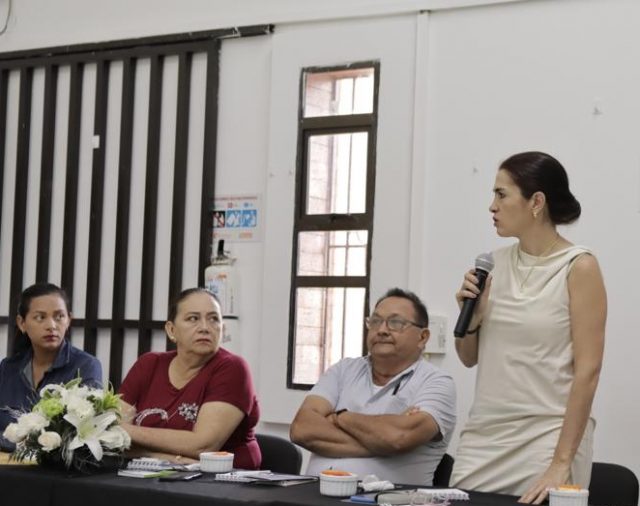Esta publicación está disponible en español.
OPI: A Platform to Track Private Sector Impact

The Observatory for Private Investment (OPI) is the only platform in Colombia that monitors the private sector’s economic and social impact in areas affected by violence and poverty. In the past five years, OPI disseminated its findings in over 50 public dialogues and meetings across Colombia, involving more than 1,000 entrepreneurs and leaders from various sectors. OPI presents a model that can be replicated in other countries to showcase the private sector’s crucial contribution to the development and sustainability of peace initiatives, as well as to highlight the challenges faced by the private sector in territories affected by violence.
The Center for International Private Enterprise (CIPE) has an extensive track record of working in countries affected by conflict. CIPE currently has program activities in over 100 countries, at least 13 of which are nations suffering under some form of conflict. CIPE’s commitment to supporting environments that encourage responsible private entrepreneurship and investment remains vital to the promotion of peace and stable democracies around the world.
Forming OPI: A Window of Opportunity

For Martin Friedl, CIPE’s Director for Latin America & the Caribbean, after more than 50 years of armed conflict, the signing of the 2016 peace agreements between the Colombian government and the Revolutionary Armed Forces of Colombia (FARC) opened the doors for the private sector to become a positive force for democratic governance.
“For CIPE, strengthening the rule of law was essential to enable the population in areas most affected by violence to engage in productive activities. We envisioned the private sector playing a more prominent role, assisting the state in constructing a legal and territorial peace framework beneficial not only for business but also for the general population,“ Friedl explained.
What Insights Does OPI Provide?
OPI’s platform currently tracks 22 indicators related to private sector impact, such as the number of companies, economic activity, and projects that have been implemented by companies through the Public Works Tax Deduction. This benefit is a government incentive program that enables companies to pay 50% of their income tax by investing it in in public infrastructure in 344 municipalities affected by violence and poverty.
According to Jaime Arteaga y Asociados (JA&A) CEO Jaime Arteaga, “Municipalities where social investment projects were previously limited are now beneficiaries of road and infrastructure projects. In 2022, the Public Works Tax Deduction Program supported around $100 billion in private investment and nearly $120 billion in private investment geared towards public works.” OPI indicators reveal that the business landscape in territories affected by violence has been continuously growing since the signing of the 2016 peace agreements. Compared to 2016, entrepreneurs are creating twice as many companies in regions affected by violence.
Who Benefits from OPI’s Data?
Companies are not the only beneficiaries of the OPI indicators. Other stakeholders such as government entities, cooperation agencies, civil society organizations, and universities use the OPI as a reference point for monitoring the implementation of the peace agreement.
According to Felipe Zarama, a researcher at the Ideas for Peace Foundation, OPI’s data supports many of the arguments and theories they have constructed about the armed conflict in Colombia. “After analyzing the data on business growth, we found that in municipalities with a higher number of forced displacements, that is, where the armed conflict continues, fewer businesses are created and maintained. The end of the armed conflict is necessary for the creation and sustainability of businesses,” added Zarama.
For Nathalie Renaud, USAID Colombia Deputy Director of the Programs Office, the informal employment in these territories also represents one of the greatest challenges for collecting OPI data, because most of this workforce cannot be measured. “Extortion is a looming risk for many micro and small business owners, and for this reason, they are not as open to disclosing figures related to their businesses,” said Renaud.
“In municipalities where armed conflict continues, fewer businesses are created and maintained.”
According to Deccy Ibarra González, Executive President of the Chamber of Commerce of Putumayo, through open dialogues across the country, entrepreneurs and leaders can conduct a comparative analysis of the different territories. Additionally, data collected by OPI allows the Chambers of Commerce to contrast and identify new services they can offer to support entrepreneurs.
Beyond OPI: Future Plans
In 2024, CIPE concludes its funding cycle for the OPI, leaving behind the necessary capacity for long-term sustainability under the leadership of JA&A. “We will continue working for the OPI and its ideal of defending peace through the business sector, promoting dialogues with different sectors, and advocating for new tax mechanisms that can contribute to the development of the most vulnerable regions,” added Jaime Arteaga.

CIPE will continue strengthening the business community and private sector participation in areas most affected by violence and poverty in the country. Ángela María Vélez, CIPE’s Colombia Country Office Director, concludes that “CIPE is committed to identifying the barriers and opportunities for the private sector in regions most affected by violence and poverty. CIPE is currently working with think tank Fedesarrollo to provide better analytical tools to meet these objectives. CIPE will share the findings from this work with leaders and stakeholders to support responsible and transparent business participation in post-conflict areas.”
Published Date: May 30, 2024
